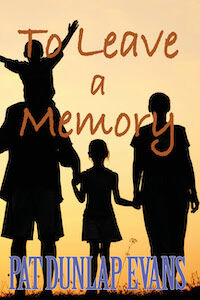THE STAGE 32 LOGLINES
Post your loglines. Get and give feedback.

TO LEAVE A MEMORY
By Pat Dunlap Evans
Decades after making a mistake that cost his son’s life, a curmudgeonly professor must find a way to atone for his error and regain the love of his psychic wife, nerdy daughter, clever grandchildren, and supportive Black best friends.
SYNOPSIS:
SUMMARY: Set in Atlanta, the story opens as retired university professor ANDREW WARD, unhealthy and pale at 70, wanders the house during a nighttime storm. He flips through an old yearbook, finds a crinkled dance corsage, and relives his love for his wife LIZZY, still blond and shapely at 70. As Andrew counts beats between the lightning and a thunderclap, Lizzy tosses and turns in their bedroom, recalling a long-ago premonition that foretold the death of their son BILLY, 18—a vision Andrew tragically ignored.
Lizzy sees the thunder as an omen to leave Andrew. She’s beyond lonely, since her husband spends each day in a backyard workshop, talking to his dog, and trying to write a metaphoric novel to convey his apology and “leave her the colors of my memories,” as he says. To fill the void, Lizzy swills too much grocery-store wine and hosts Saturday brunch for their daughter JANE, a late-30s tech guru with three clever kids. On Sundays, Lizzy attends Unitarian church where she finds solace, and later brunches with her lifelong friend OUISIE (pronounced Weezie), a pudgy Black-American.
Forgotten in the parents’ divide, Jane can't forget or forgive Billy’s death, dwelling on her parents’ relationship to the detriment of her marriage to ALAN, a handsome tax attorney.
In a first-act climax, Andrew has a crippling stroke that returns his mind to summer days at Lake Blackshear, where young ANDY, his older brother TOMMY, and two pals play submarine in the lake and try to get nightly locomotives to smash their pennies on rails. Each stroke flashback reveals the brothers’ rivalry, their father’s bias for Tommy, their mother’s devotion to Andy, and the memories that become Andrew’s final monologue.
Andrew awakens in the hospital, unable to speak, write, or remember who Jane, Alan, or the grandkids are. But he does remember “Wuzzzzzzzy.” Feeling guilty, she decides she cannot leave him now, although Ouisie wants Lizzy to go her own way. This leads to a rift, when Ouisie mindlessly blurts an insult, and Lizzy realizes Ouisie sees Andrew as a racist.
Lizzy is so hurt by the loss of Ouisie’s friendship, she seeks counseling from her minister, a quirky Humanist who’s in hot water with Ouisie’s husband GUY, the board president. A goateed Jamaican, Guy is a retired colleague of Andrew’s, although far less successful. Ouisie resents this, saying Guy was held back by racism. When Lizzy apologizes for whatever she and Andrew may have done wrong, the two women mend their rift. But, Ouisie admits that Guy could have politicked and published more. “He wasn’t lazy. He was angry,” she says.
After weeks of physical therapy, Andrew’s health improves. The family and friends enjoy a comical Mother’s Day out, the first time in decades. Later that evening, Andrew and Lizzy even have sex in a droll scene when he tells her, “We have a visitor. I think my meds have stirred things up.” The next morning, Lizzy giddily confides to Ouisie, and Andrew feels buoyant enough to take a drive to Sonic for a burger with his dog.
In Act 3, all seems well for Lizzy and Andrew, until another stroke hits, returning him to childhood memories and a lengthy stay in rehab. While he’s away, Jane reads her father’s apologia and realizes he’s trying to atone. She decides to recreate his writer’s workshop in Lizzy’s sunroom and furiously installs elaborate tech gizmos to help Andrew complete his “novel.” A stern taskmaster, Jane teaches him to use a computer. The three grandkids help as well, forming a bond with their grandfather for the first time.
Lizzy relishes watching Andrew interact with family at last. The only relative who remains estranged is Andrew’s brother THOMAS, 70s, an arrogant tech millionaire. He confronts Andrew after Billy’s death, and Andrew angrily banishes him from his home. The brothers do not see each other for decades until Andrew falls ill. But Thomas remains standoffish, even during a slapstick scene in the ICU when Ouisie, Guy, and Thomas slip and fall beside a comatose Andrew’s bed. “I simply do not operate at this level,” Thomas sneers.
In the Act 3 climax, Andrew suffers a far more incapacitating stroke. Jane realizes her father is dying and urges him to simply say he’s sorry, rather than write some grand novel. Frustrated by Andrew’s inability to reply, Jane realizes, “Oh, Poppa, I guess I’ve been blaming you all along. All of us did. Momma, me, Uncle Thomas, who else?” The unspoken answer: Andrew blames himself too. Later that night, Jane and her husband Alan have an argument that resolves in a sudsy bathtub scene when Jane realizes why she’s trying so hard to reach her father. She wants him to tell Billy goodbye for her.
The denouement opens at a poignant memorial service, when we realize Andrew has died. After a crowded reception at Lizzy’s house, she and Jane feel let down, as if Andrew failed in his mission. But Lizzy discovers a letter tucked in the old yearbook, where her grandson helped Andrew place it. On it is a poem of sorts, written in the broken syntax of a stroke victim. As Lizzy and Jane read the oddly written lines, Andrew appears in an ethereal image, voicing his apology, his abiding love, and the colors of his memories.
COMPS: The feature film THE FATHER falls somewhat in the same arena, especially the father-daughter relationship. Another film I recall (okay, so it’s an oldie) is ON GOLDEN POND, again related to words unsaid that needed to be expressed.


Rated this logline